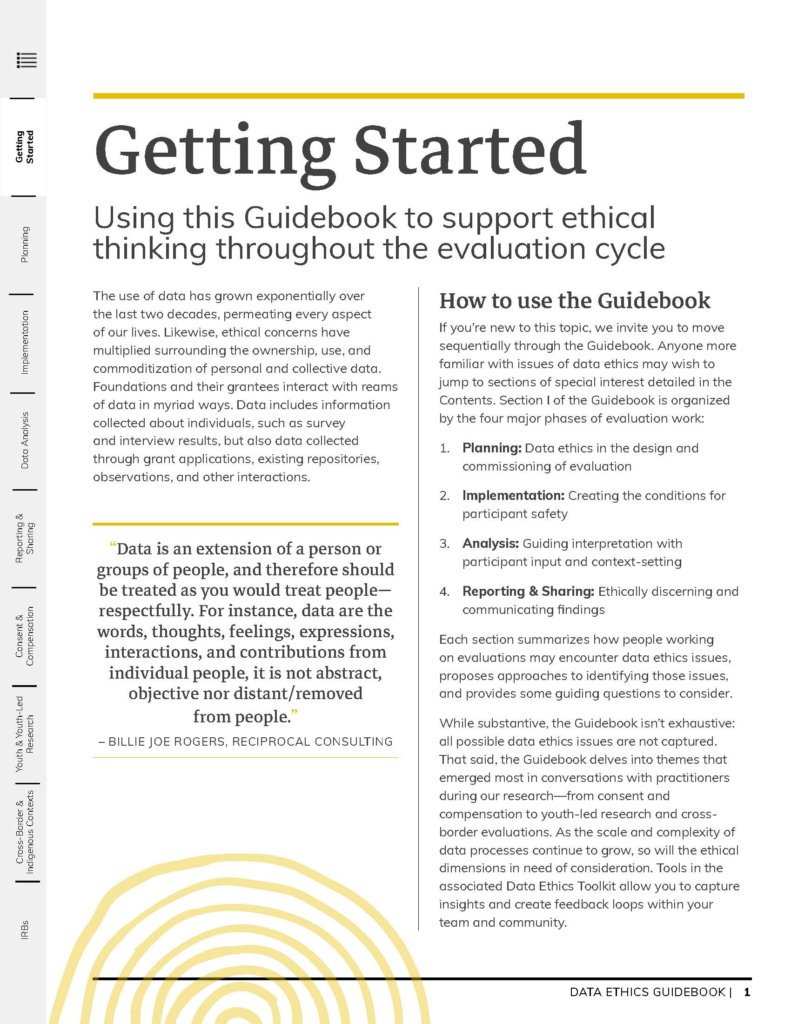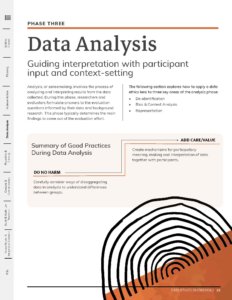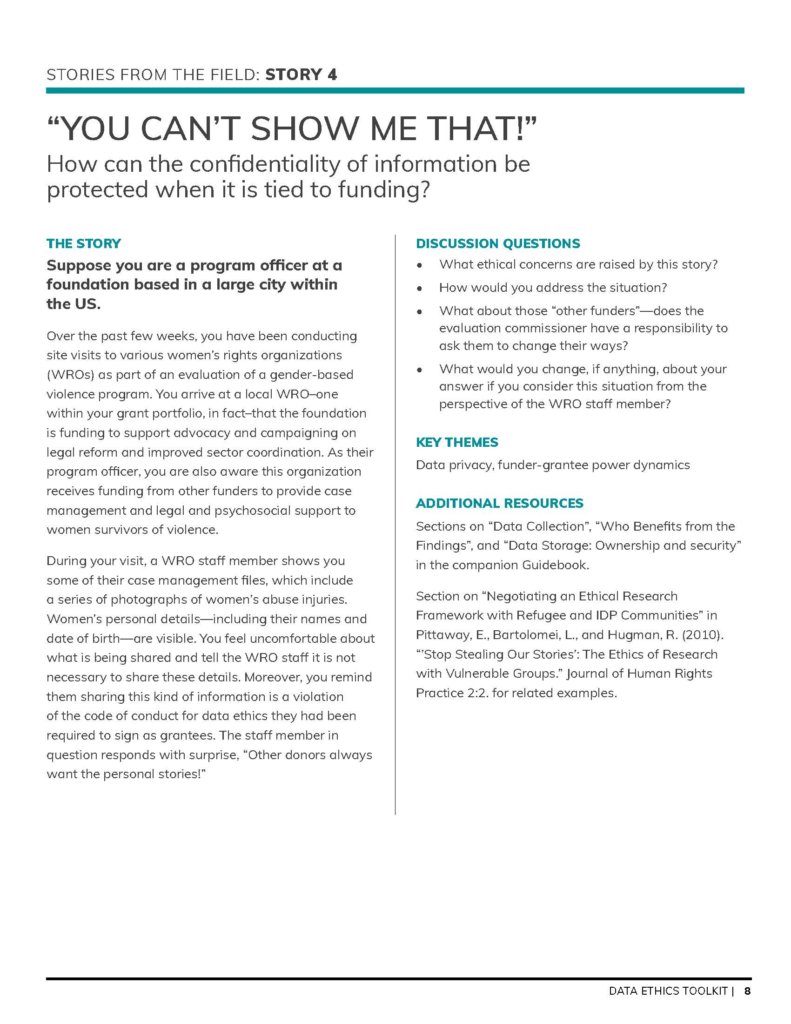Our Data Ethics Guidebook and Toolkit can serve as go-to resources for foundation staff, evaluators, and nonprofit partners, delivering practical guidance and customizable tools for navigating ethical issues in research and evaluation.
The Intervention
The use of data has grown exponentially over the last two decades, permeating every aspect of our lives. Ethical concerns have multiplied surrounding the ownership, use, and commoditization of personal and collective data, particularly as the scale and complexity in which foundations, grantees, and practitioners interact with data and conduct research and evaluation grow. Ethical considerations extend from protecting data security and ensuring free, prior, and informed consent to issues of power in the evaluation, how evaluation results will be used, and fair compensation for evaluation participants.
To develop useful guidance to enhance capacity with data ethics for the social sector, the David and Lucile Packard Foundation invited Informing Change to partner with them in the development of an updated Data Ethics Guidebook. This Guidebook offers a robust framework for evaluation practitioners to assess and respond to ethical issues in applied research and evaluation activities.
The Challenge

Discussions of ethics in evaluation often return to two overarching questions: “Why is an evaluation being undertaken in the first place?” and “Who gets to make decisions about the evaluation along the way?” A consistent tension within the current evaluation paradigm is how to balance values—like equity and participation—within the framework of protection.
Our team drew on our own experience and that of our colleagues, and worked closely with members of the Evaluation & Learning team and the Office of the General Counsel at the Packard Foundation throughout the project. Still, we knew we needed broader perspectives to shape a truly effective Guidebook. We spoke with staff at other foundations, as well as other evaluation practitioners to understand more about the ethical issues they grapple with every day and the ethical standards they aim for in their work.
From our conversations, we learned the toughest issues have no clear answer and that going beyond simply “do no harm” is an aspiration many hold but are still working to achieve. We should not only strive to avoid unethical approaches, but actively seek to build in care and add value to interactions with participants. It is essential, however, to meet the basic principle of “do no harm” first.
Our Solutions
 The biggest recurring theme in our conversations with practitioners was the need for a sounding board for talking through the thorniest ethical issues. Developing a data ethics mindset is about adopting a stance of continuous learning that allows us to work with ever greater skillfulness. This shaped how we constructed the Guidebook and our decision to add an accompanying Data Ethics Toolkit. These resources are intended for anyone grappling with how to do evaluation more ethically outside a formal academic setting, such as nonprofits, philanthropies, or agencies. Readers can use it to:
The biggest recurring theme in our conversations with practitioners was the need for a sounding board for talking through the thorniest ethical issues. Developing a data ethics mindset is about adopting a stance of continuous learning that allows us to work with ever greater skillfulness. This shaped how we constructed the Guidebook and our decision to add an accompanying Data Ethics Toolkit. These resources are intended for anyone grappling with how to do evaluation more ethically outside a formal academic setting, such as nonprofits, philanthropies, or agencies. Readers can use it to:
- Explore data ethics issues as they affect research and evaluation today
- Think critically about these issues as they emerge during your work
- Gain insight into how others are wrestling with data ethics issues
- Practice applying a critical, ethical lens to common issues in evaluation and research
The Guidebook includes questions to ask during each phase of evaluation—from design to dissemination. It also identifies a continuum of practices – from those ensuring an evaluation “does no harm” to those that add care or value for participants. The Toolkit contains practical ways for individuals or teams tasked with evaluations to strengthen their ethical thinking muscles and identify what they want to do differently going forward. Taken together, they are designed to help practitioners adapt to changing contexts and chart an ethical way forward with increasing skill, sensitivity, and confidence.

Throughout, we have woven in Stories from the Field, shaped by the experiences of real-world evaluation practitioners, that illuminate ethical issues and that can be used as “teaching cases” in team discussions or workshops. As these Stories illustrate, binary prescriptions of right or wrong are overly simplistic. Instead, the Guidebook and Toolkit offer a framework for developing an ethical mindset that boosts skillfulness in adapting to changing contexts and needs.
The Packard Foundation’s investment in this work enables us to make the Guidebook and Toolkit freely available to all.
A Note on Language Conventions
The evaluation community at-large is always contemplating and reassessing what data ethics should mean in evaluation and applied research, but it is doing so now more intensively than ever. One topic of ongoing debate – not explicitly discussed in the Guidebook or Toolkit – is the best language with which to be inclusive, representative, and uplifting of the identities and communities being discussed in any given research project.
Like many in the field, we find the American Psychological Association’s Inclusive Language Guidelines to be an invaluable resource. However, we acknowledge our personal implicit biases and lived experiences leave us open to inadvertently using language and phrasing that may be harmful, including in the Guidebook and Toolkit.
We consider the Guidebook and Toolkit to be living documents and welcome feedback on these and any other issues for future iterations. To share feedback, please email us at dataethics@informingchange.com.



 The biggest recurring theme in our conversations with practitioners was the need for a sounding board for talking through the thorniest ethical issues. Developing a data ethics mindset is about adopting a stance of continuous learning that allows us to work with ever greater skillfulness. This shaped how we constructed the Guidebook and our decision to add an accompanying Data Ethics Toolkit. These resources are intended for anyone grappling with how to do evaluation more ethically outside a formal academic setting, such as nonprofits, philanthropies, or agencies. Readers can use it to:
The biggest recurring theme in our conversations with practitioners was the need for a sounding board for talking through the thorniest ethical issues. Developing a data ethics mindset is about adopting a stance of continuous learning that allows us to work with ever greater skillfulness. This shaped how we constructed the Guidebook and our decision to add an accompanying Data Ethics Toolkit. These resources are intended for anyone grappling with how to do evaluation more ethically outside a formal academic setting, such as nonprofits, philanthropies, or agencies. Readers can use it to: